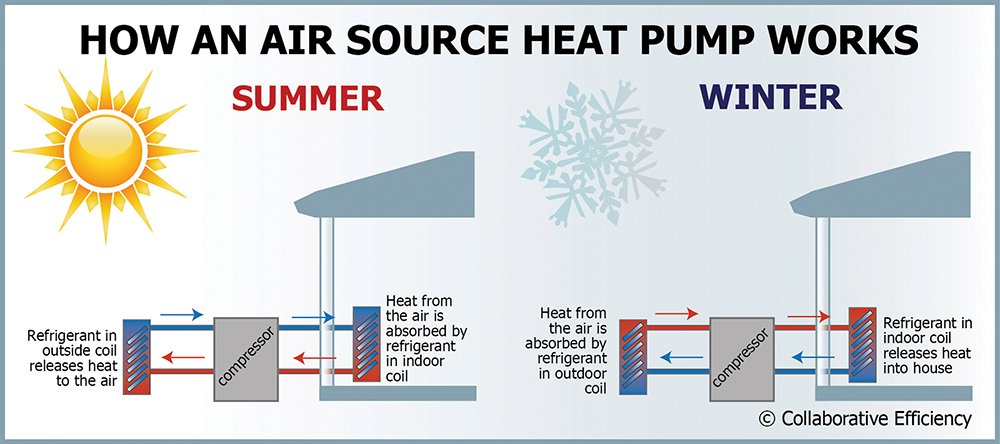Question:
It looks like we’ll be needing to replace our furnace soon, and we’re wondering if a heat pump would help us save some money. Do you have any suggestions?
Answer:
An electric air source heat pump can be a good alternative to a furnace system that runs on propane or fuel oil. A heat pump is also a cost-effective alternative to electric resistance heat that is used in electric furnaces and in baseboard and wall units.
How heat pumps work
In the summer, an air source heat pump acts as an air conditioner (AC) that draws heat from your home’s air and transfers it outside. In the winter, the system’s direction is reversed so that heat is pulled from the outside air and moved into your home.
The heat pump has two major components: the condenser (also called the compressor) that circulates refrigerant through the system; and an air handler that distributes the conditioned air. Most heat pumps are split systems, with the condenser located outside and the air handler inside. A packaged system contains both components in one unit that is placed outside your home. Heat pumps usually distribute the hot or cold air through the duct system. Ductless mini-splits, which can serve as many as four rooms, will be covered in next month’s column.
In the past, heat pumps weren’t efficient enough to work in colder climates. In recent years, however, technology has advanced to make them viable in climates with long periods of sub-freezing temperature, such as the Northeast U.S.
If your old furnace has an air conditioner (AC) attached, replacing both the heating and cooling system with the all-in-one solution of a heat pump might produce significant cost savings. If you are currently cooling with window units, or have an older central AC, moving to an air source heat pump could reduce your summer energy bills.
Heat pumps not only reduce energy costs, they can also eliminate the risk of carbon monoxide poisoning and problems that can occur with on-site storage of propane or heating oil.
Heat pumps must work harder to extract heat as the outside temperature drops. At some point the heat pump switches to resistance mode, which operates the same way a toaster or an electric baseboard heater works. If your area has very cold winters, you should consider a dual fuel system, which utilizes a heat pump along with a gas or propane furnace.
Selecting and installing
If you live in a cold climate, look for a unit with a higher HSPF rating, which measures heating efficiency; if you live in a warm climate, you probably want to focus more on the SEER rating, which measures cooling efficiency. The minimum standard heat pump is SEER 14 and HSPF 8.22. An easy way to compare options is to look for the ENERGY STAR® label. This indicates the unit is at least 15 SEER and 8.5 HSPF3. Visit www.energystar.gov to learn more about equipment, installation and qualified contractors.
How much can a heat pump reduce your energy costs? This depends upon the size and efficiency of your home, local energy prices and local climate. You can find calculators online that can help you predict energy savings. One entry with sample data found that the cost of heating in South Carolina, using a new heat pump and national average fuel costs, was less than half the cost of heating with a typical propane furnace or an electric resistance system.
Energy auditors can predict energy savings with greater precision, and they can offer advice on choosing a specific brand and size of the unit. More importantly, energy auditors can suggest other ways to improve comfort or reduce energy use such as duct sealing or insulating the building envelope.
Your local HVAC dealer, if they have heat pump experience, can be very helpful. Many heat pumps are not installed correctly, so be sure to ask how they will ensure a quality installation. Contact your local electric co-op to find out what they recommend. They may even offer rebates, free audits or discounted rates for electric heat.
This column was co-written by Pat Keegan and Brad Thiessen of Collaborative Efficiency. For more information on heat pumps, please visit: www.collaborativeefficiency.com/energytips.
Patrick Keegan writes on consumer and cooperative affairs for the National Rural Electric Cooperative Association, the Arlington, Va.-based service arm of the nation’s 900-plus consumer-owned, not-for-profit electric cooperatives. Write to [email protected] for more information.





